Uncover the intriguing possibility of a connection between Biblical Moses and Egyptian Queen Nefertiti, an unexpected twist in historical and religious narratives.
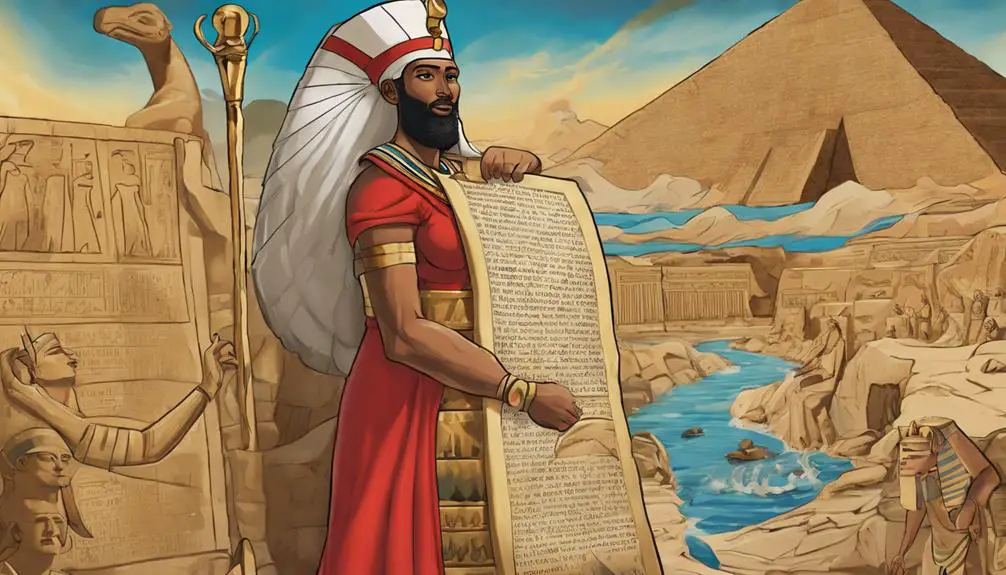
Moses and Nefertiti in the Bible
You might not know that some historians believe Moses, the iconic biblical figure, could have had a surprising connection to Nefertiti, the revered Egyptian queen.
This claim, though not universally accepted, hinges on the timelines of their lives and the overlaps in the tales of the Bible and ancient Egyptian records.
Do these threads truly intertwine, or are they mere coincidences? It's a compelling question, one that challenges our understanding of history, religion, and the power of stories.
Stick around, you might be surprised by the possibilities this discussion uncovers.
Key Takeaways
- Moses, raised in Egyptian palaces, emerged as a prophet leading Israelites to liberation.
- Nefertiti, symbolizing beauty and power, played a crucial role in shifting Egypt to monotheism.
- There's ongoing debate about Nefertiti possibly being Moses' stepmother, with insufficient historical evidence.
- Theories suggest Moses and Nefertiti's paths intersected, but these lack substantial archaeological or historical backing.
Moses: From Prince to Prophet
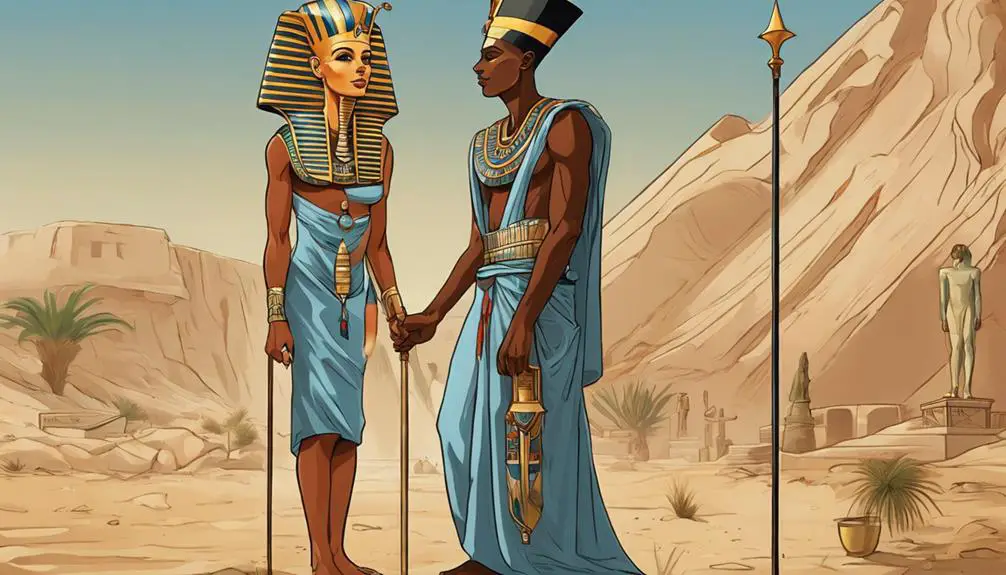
Diving into the transformative journey of Moses, you'll encounter a tale that begins in the palaces of Egypt, where he was raised as a prince, and culminates in the deserts of the Sinai Peninsula, where he emerged as a prophet. This Prince's Transformation is a tale of intrigue, courage, and divine destiny. Born into Hebrew slavery, but adopted by Egyptian royalty, Moses' early life was shaped by a duality of cultures.
The defining moment of Moses' Leadership, however, didn't occur within palace walls. Rather, it was at the burning bush in the desert where he received a divine mandate to lead his people out of Egypt. This marked a pivotal shift in Moses' identity, from Egyptian prince to Hebrew prophet. His leadership wasn't a product of his royal upbringing, but rather an innate quality that was honed and directed towards a divine purpose.
Moses' exodus from Egypt was more than just a physical journey; it was a spiritual transition, a metamorphosis of identity and purpose. He was no longer a prince of Egypt, but a prophet of a God who liberates the oppressed. His transformation offers a profound narrative of leadership, faith, and identity in the face of adversity.
Nefertiti: Egypt's Influential Queen
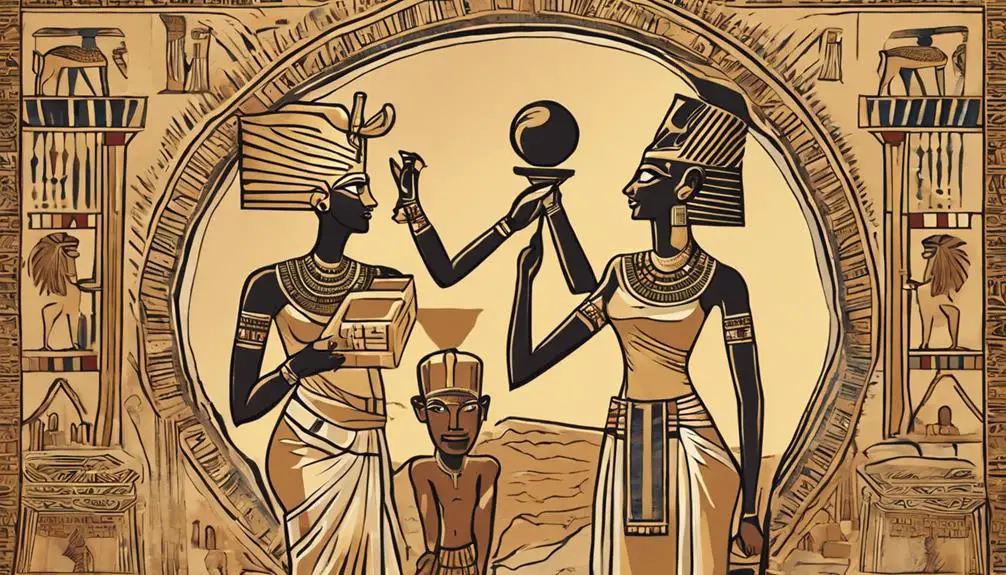
Shifting our focus to another notable figure from ancient Egypt, let's delve into the story of Nefertiti, the queen whose influence stretched far beyond the confines of the royal court. Nefertiti, whose name means 'the beautiful one has come', was the Great Royal Wife of Akhenaten, an Egyptian Pharaoh. She was an influential figure in the Amarna Period, when there was a religious shift in Egypt.
- Nefertiti's Legacy: Nefertiti's legacy is enduring. Her famous bust, discovered in 1912, is one of the most copied works of ancient Egypt, symbolizing female beauty and power. It's a key part of Egypt's cultural patrimony, reminding us of her influence and status.
- Religious Revolution: Under Nefertiti and Akhenaten's rule, Egypt experienced a religious revolution. They moved Egypt from polytheism to monotheism, worshipping only the sun god, Aten.
- Queen's Influence: The queen's influence was significant. She wasn't just a queen, but a co-regent with her husband. Some evidence suggests she may have ruled Egypt alone after her husband's death.
Nefertiti's influence, both in her lifetime and posthumously, showcases the powerful role women played in ancient societies, often shaping the course of history.
Controversies Surrounding Moses and Nefertiti
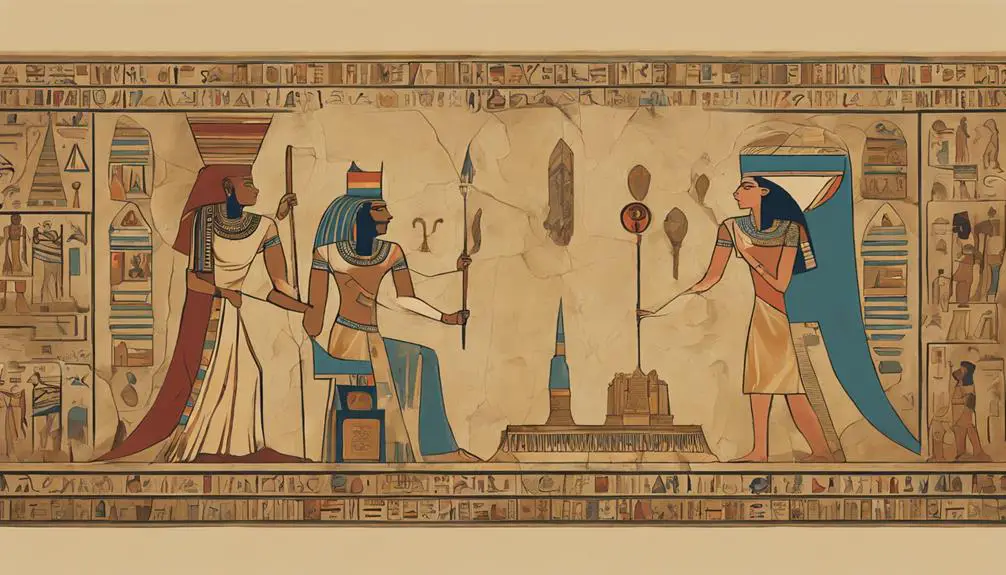
While appreciating Nefertiti's influence and power, it's also intriguing to examine the controversies that arise when her story intertwines with that of Moses, another significant figure in ancient history.
Nefertiti's influence was formidable, but her possible connection to Moses stirs debate. You may be aware of the theory that Nefertiti was Moses' stepmother, a claim that's met with both intrigue and skepticism. Many argue there's insufficient historical evidence to back this up, leading to heated debates among historians, theologians, and archaeologists.
Then there's the controversy surrounding Moses' origins. Traditional accounts place Moses as a Hebrew born into slavery, later adopted by Egyptian royalty. However, some propose that he was actually of royal Egyptian blood, further complicating his connection to Nefertiti. This controversy isn't just a matter of lineage, but impacts our understanding of socio-political dynamics of that era.
Hidden Connections: Moses and Nefertiti
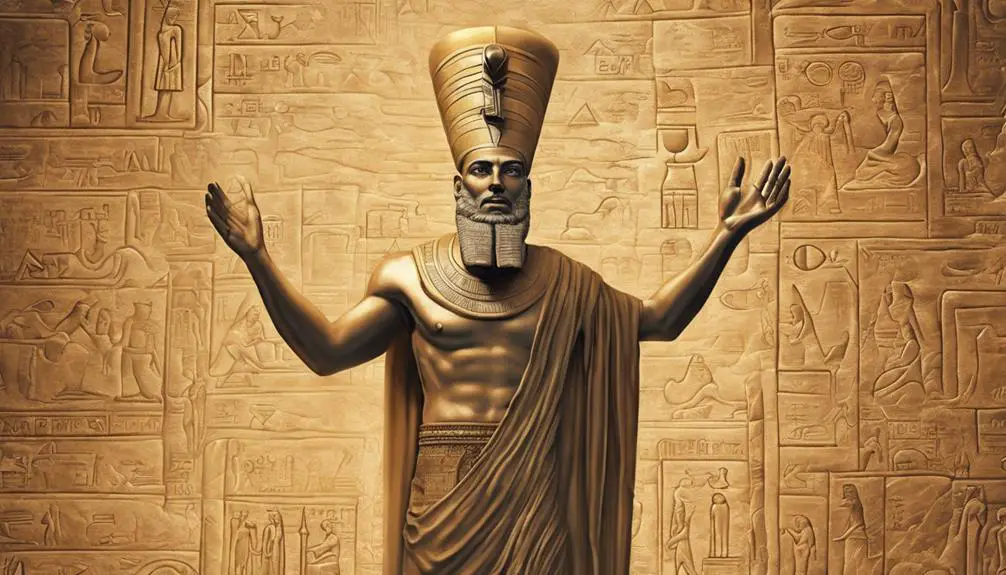
Have you ever considered the hidden connections between Moses and Nefertiti, two of the most influential figures of ancient history? These links can be unearthed through careful examination of various sources, including religious interpretations and accounts from ancient times.
- Religious interpretations: Both Moses and Nefertiti have significant roles in their respective religions. Moses, a prophet in Judaism, Christianity, and Islam, led the Israelites out of Egypt. Nefertiti, revered as a Queen in ancient Egypt, is often associated with the monotheistic worship of the sun god Aten. Their religious impact, albeit in distinct faiths, showcases a shared influence.
- Cultural Impact: Moses and Nefertiti have left profound cultural footprints. Moses is a symbol of liberation and law-giving, while Nefertiti represents beauty and power. Their stories have been retold and interpreted across various cultures and epochs.
- Shared Chronology: Their lives overlap in historical timelines, leading to speculation about possible interactions. Although this speculation isn't confirmed, it adds an intriguing layer to their interconnectedness.
Theories of Their Intersecting Paths
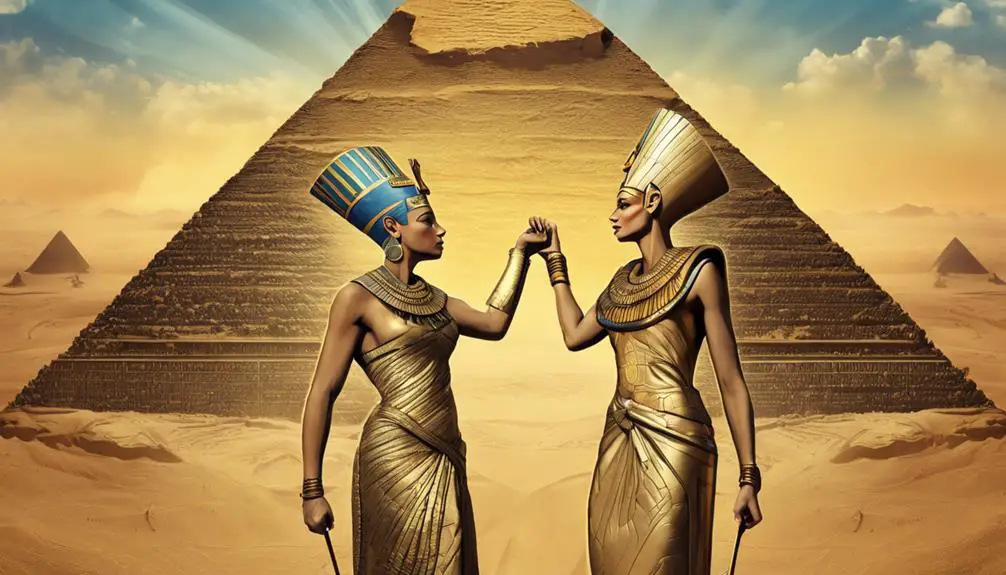
Building on these foundational connections, let's now explore various theories that suggest potential intersections in the paths of Moses and Nefertiti.
One theory, steeped in religious interpretations, posits that Moses was in fact an Egyptian prince and Nefertiti his cousin. This theory leans heavily on the biblical account of Moses being adopted into Pharaoh's household. It argues that Moses' monotheistic beliefs, reflected in Judaism, are an extension of the religious reform Nefertiti and her husband Akhenaten initiated in Egypt, transitioning from polytheism to monotheism.
Historical evidence, however, is scarce and often disputed. Some scholars cite the Amarna letters, diplomatic correspondences from Akhenaten's reign, as potential evidence of Moses' existence in the Egyptian court. Yet, these documents' translations remain controversial, and their connection to Moses is purely speculative.
There's also the theory that Moses and Nefertiti's lives intersected during the Exodus. Some believe Nefertiti might be the unnamed 'Pharaoh's daughter' who rescues Moses from the Nile. Despite its popularity, this theory lacks solid archaeological backing.
Frequently Asked Questions
What Were the Major Teachings of Moses as per the Bible?
You're delving into Moses' teachings in the Bible, focusing primarily on Mosaic Law interpretation and the significance of the Ten Commandments. These teachings formed the bedrock of societal rules and religious principles.
Moses stressed obedience to God, with the Commandments providing explicit instructions. These directives covered diverse aspects: from worshipping one God to not coveting another's property.
Essentially, Moses' teachings promoted harmony, justice, and moral conduct within society.
How Did Nefertiti Influence the Socio-Political Structure of Egypt During Her Reign?
As queen, Nefertiti greatly influenced Egypt's socio-political structure. She's known for her diplomacy, skillfully negotiating with foreign powers. Additionally, she played a key role in religious reformation, promoting monotheism over traditional polytheism.
Nefertiti's reign led to significant changes in political and religious landscapes, setting a precedent for future rulers. Her influence extended beyond her reign, leaving a lasting impact on Egypt's history.
Are There Any Descendants of Moses and Nefertiti Alive Today?
You're delving into two fascinating subjects: Moses' lineage debate and Nefertiti's progeny mysteries. Currently, there's no concrete evidence to confirm any living descendants of Moses or Nefertiti. Historical accounts and genetic tracing don't provide definitive proof.
Moses' descendants, if any, remain a topic of debate among scholars, while Nefertiti's lineage is shrouded in mystery. It's a captivating inquiry, but unfortunately, definitive answers are elusive.
Did Moses and Nefertiti Have Any Similarities in Their Leadership Styles?
When comparing leadership styles, it's important to consider key traits. Moses' diplomacy and Nefertiti's charisma were distinguishing factors.
You'd find that Moses, using diplomatic tactics, led his people through challenging situations. Nefertiti, on the other hand, leveraged her charisma to influence and manage.
While their methods differed, they both aimed for the welfare of their people. So, you can see there are similarities in their intentions, if not their strategies.
Were There Any Significant Differences in the Portrayal of Moses and Nefertiti in Other Historical Texts Outside of the Bible and Egyptian Records?
Indeed, you'll find differences in Moses' depictions and Nefertiti's representations in historical texts outside the Bible and Egyptian records. These variations can be based on the culture, period, or the authors' perspectives.
For instance, Moses might be presented as a lawgiver or prophet, while Nefertiti could be seen as an influential queen or even a heretic.
Always remember, the portrayal of historical figures can significantly differ depending on the source.
Conclusion
You've explored the intriguing lives of Moses and Nefertiti, delved into the controversies surrounding them, and examined theories of their possible connection.
Both influential in their respective realms, their paths might've crossed in history's labyrinth.
Although concrete evidence is elusive, the idea that these two monumental figures could have been contemporaries is fascinating.
It invites us to question, explore, and seek the hidden truths in the untold stories of our past.

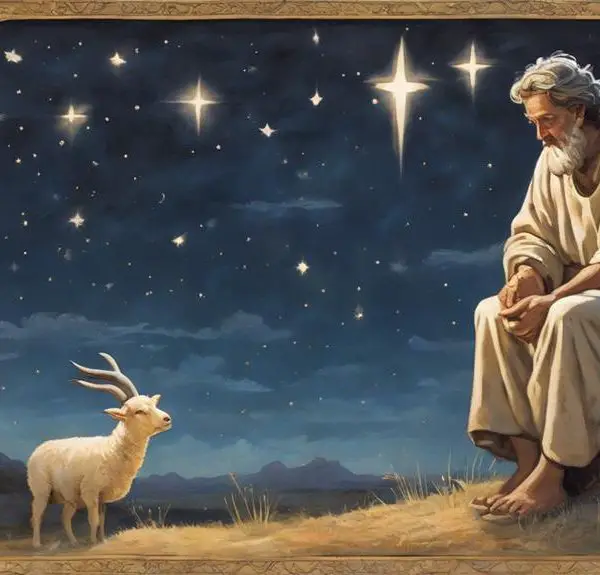
Sign up